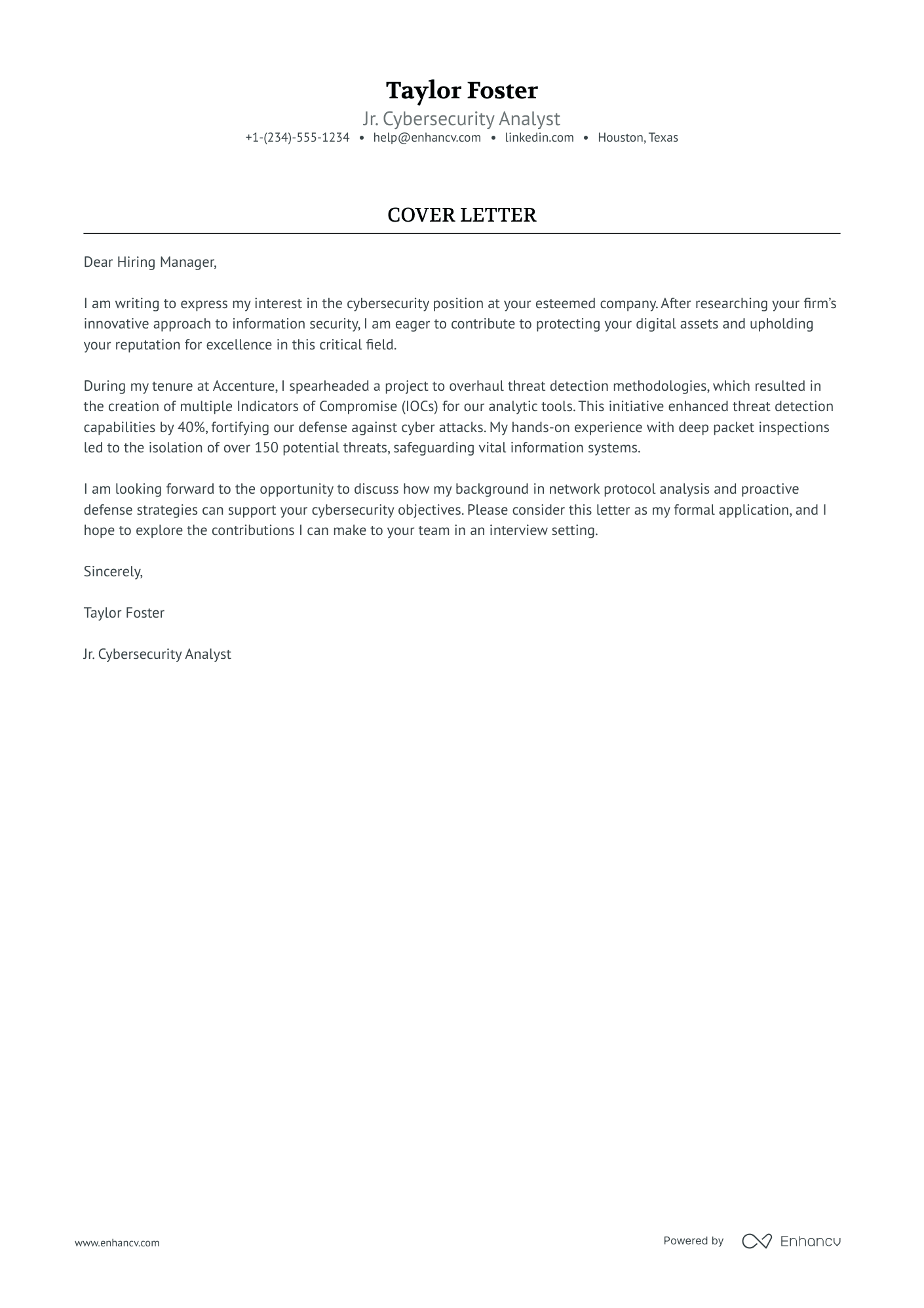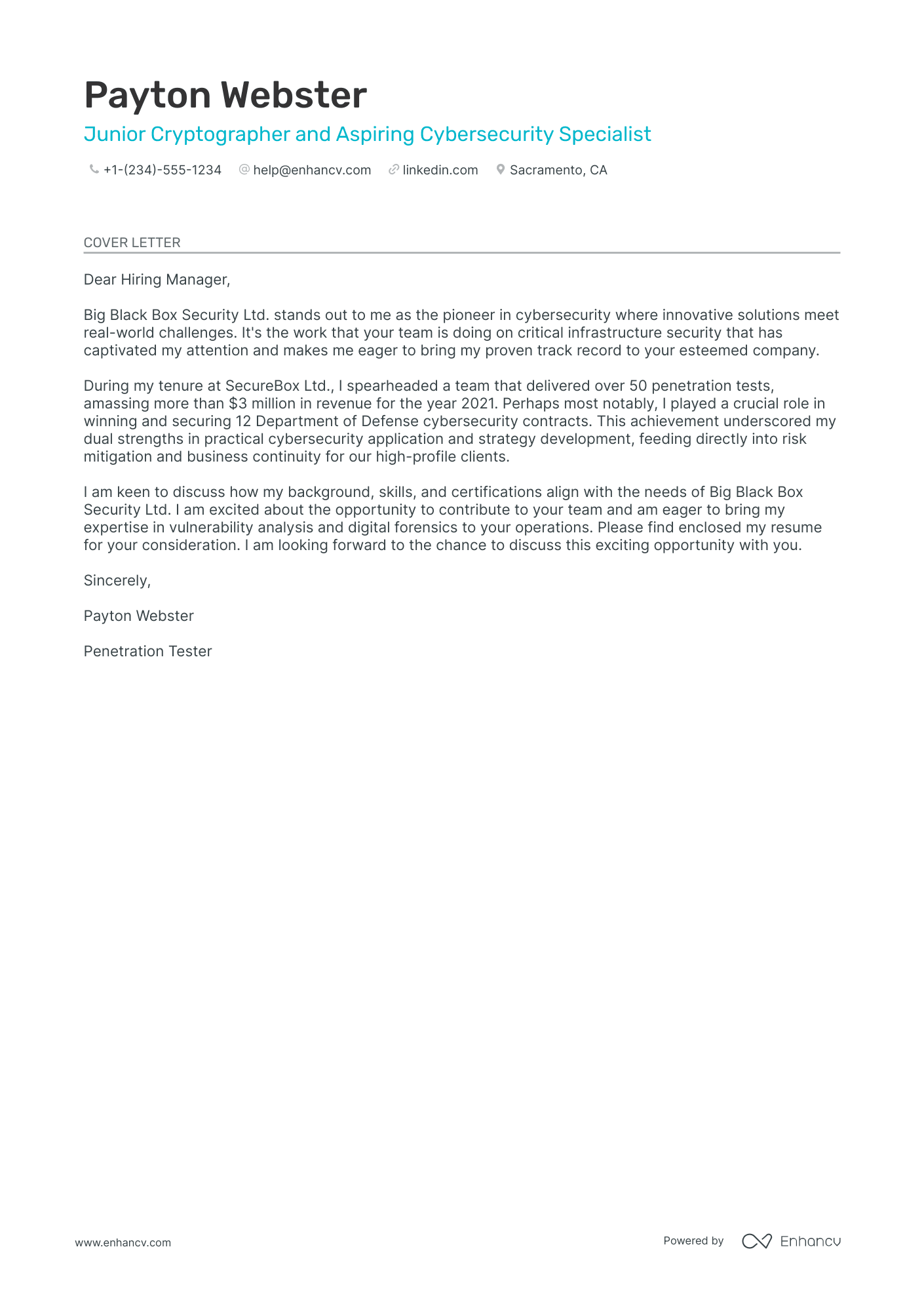Crafting a cyber security analyst cover letter can be daunting. You've been diligently applying for jobs, only to realize each application must be paired with a compelling cover letter. This isn't a repeat of your resume; it's your chance to showcase that standout professional achievement in a succinct story. Striking the right tone—formal yet original and free of clichés—is crucial. And remember, brevity is key: your gripping narrative must fit neatly on one page. Let's dive in and make your cover letter shine.
- Write a cyber security analyst cover letter that helps you stand out (and get the job);
- Understand how to start and end your cyber security analyst cover letter with the appropriate greeting;
- What to include in the body of your cyber security analyst cover letter to put your best foot forward;
- Your most important achievements - how to present them as part of your cyber security analyst cover letter.
And if you want to make your life even easier, simply drag and drop your cyber security analyst resume into Enhancv's AI cover letter generator, and it will write your cover letter for you in just a few moments.
If the cyber security analyst isn't exactly the one you're looking for we have a plethora of cover letter examples for jobs like this one:
Drop your resume here or choose a file.
PDF & DOCX only. Max 2MB file size.
Cyber security analyst cover letter example
Jackson Miller
San Diego, CA
+1-(234)-555-1234
help@enhancv.com
- Emphasizing relevant experience through a specific achievement, like the development of a cutting-edge threat detection system, effectively showcases a candidate's technical ability and impact in the field.
- Highlighting successful teamwork and collaboration during a high-stakes cyber-attack demonstrates the applicant's capability to work well within a team, a critical skill for complex cybersecurity environments.
- Expressing eagerness to contribute to the team and confidence in adding significant value suggests a proactive and enthusiastic attitude, indicating a strong cultural fit and personal investment in the company’s mission.
What are the basics of the design or format of your cyber security analyst cover letter?
To start, here's a reminder for you: the Applicant Tracker System (or software that is used to assess candidate profiles), won't be reading your cyber security analyst cover letter.
Recruiters enjoy reading cyber security analyst cover letters with a standardized format that uses:
- the same font as the resume (e.g. modern ones like Raleway or Volkhov are prefered over the clichéd Times New Roman or Arial);
- single spacing to keep the content concise and organized (this is all ready for you in our cover letter templates);
- a one-inch margin to wrap around the text, like in our cover letter builder;
- PDF as a file format, as it allows your design (and visual element) to stay the same.
Finally, we can't go on without mentioning the key sections of your cyber security analyst cover letter.
In the top one-third, make sure to include a header (with your contact information, name, role, and date), a salutation, and an introduction.
Next, follows the heart and soul of your cyber security analyst cover letter or its body.
End your cyber security analyst cover letter with a closing paragraph and, if you wish, a signature.
Skip the hassle of writing a cover letter. Use our free cover letter generator and get it done in moments.
The top sections on a cyber security analyst cover letter
- Header: This should include the candidate's name, contact information, and the date, establishing the professional format of the cover letter and providing easy access to their details for follow-up.
- Greeting: This is where the candidate should address the hiring manager by name if possible, demonstrating attention to detail and a personalized approach that is crucial in cybersecurity roles.
- Introduction: The opening should succinctly state the applicant's interest in the cybersecurity position and mention a key qualification or experience that makes them a strong fit, instantly grabbing the recruiter's attention.
- Body: The body of the cover letter should delve into specific technical skills, cybersecurity certifications, and experiences, demonstrating the candidate's expertise and how it aligns with the job requirements.
- Closing: In the closing section, the applicant should reiterate their enthusiasm for the role, invite further discussion, and thank the recruiter for their consideration, showing professionalism and courtesy important for any cybersecurity professional.
Key qualities recruiters search for in a candidate’s cover letter
- Analytical mindset: Analytical skills are crucial for a cyber security analyst to assess system vulnerabilities, analyze risk, and respond to incidents effectively.
- Technical expertise: Proficiency in security technologies, network infrastructure, encryption, and firewall configuration is essential to protect against cyber threats.
- Attention to detail: The ability to meticulously review code, system configurations, and logs helps identify and mitigate potential security breaches.
- Incident response experience: Experience in handling security breaches and familiarity with incident response protocols is vital for quickly addressing and neutralizing threats.
- Continual learning: Cybersecurity is a field that evolves rapidly, so a commitment to continual learning and staying updated on the latest threats and security trends is highly valued.
- Communication skills: The ability to clearly articulate security risks and incident reports to both technical and non-technical stakeholders is important for effective collaboration and organizational awareness.
What greeting should you use in your cyber security analyst cover letter salutation
A simple "Hello" or "Hey" just won't work.
With your cyber security analyst cover letter salutation, you set the tone of the whole communication.
You should thus address the hiring managers by using their first (or last name) in your greeting.
But how do you find out who's recruiting for the role?
The easiest way is to look up the role on LinkedIn or the corporate website.
Alternatively, you could also contact the organization via social media or email, for more information.
Unable to still obtain the recruiter's name?
Don't go down the "To whom it may concern path". Instead, start your cover letter with a "Dear HR team".
List of salutations you can use
- Dear Hiring Manager,
- Dear [Company Name] Team,
- Dear [Department Name] Hiring Team,
- Dear [Mr./Ms./Dr.] [Last Name],
- Dear [First Name] [Last Name],
- Dear [Job Title] Search Committee,
Get creative with your cyber security analyst cover letter introduction
Recruiters are going to assess plenty of candidate profiles for the role. Thus, anything you do to stand out will win you brownie points.
Use your cyber security analyst cover letter introduction to share something memorable about your experience.
But before you go down the rabbit hole of creativity and humor, align your message with the company culture.
For example, if you are applying for a role in some startup, use those first two sentences to tell a funny story (about your experience) to quickly connect with the recruiter.
The middle or body of your cyber security analyst cover letter body: a great instrument to tell a story
Now that you've set the right tone with the greeting and introduction of your cyber security analyst cover letter, it's time to get down to business.
Hear us out, the body of your cyber security analyst cover letter is the best storytelling instrument you have, in your job-hunting arsenal.
Writing the next three to six paragraphs, take the time to reassess the advert to discover job-crucial requirements.
Next, choose one accomplishment that covers those key skills and talents.
Use precisely that achievement to tell an exciting story of how you match the ideal candidate profile.
In the undertones of your story or cyber security analyst cover letter body, hint at the difference you'd make and sell your application as the perfect one for the job.
Closing remarks to end your cyber security analyst cover letter
Of course, you'll have to show gratitude to the recruiters, who have assessed your profile at the end of your cyber security analyst cover letter .
A "Thank you for the consideration" would work wonders, instead of the standard "Sincerely yours".
Do you want to make an even better impression?
Close off your cyber security analyst cover letter by promising how you see yourself excelling in the role and the positive impact you'd bring about.
A sentence that encourages some further action on the recruiter's end could also be a good way to close off the communication (e.g. provide your availability for an interview).
The zero experience cyber security analyst cover letter: shifting the focus to your unique value
Don't worry if you have no conventional professional experience. Within your whole experience, there's plenty more you can write about in your cyber security analyst cover letter.
Take, for example, your biggest achievement or award - dedicate your cover letter body to describe it and the job-relevant skills you've learned.
Your professional ambitions could also take center stage. Describe what you plan on achieving in the next five to ten years and the efforts you're making towards your dreams.
Key takeaways
Summarizing the most important aspects in writing your cyber security analyst cover letter, remember to:
- Create a personalized cyber security analyst cover letter for each role you apply for, that includes the recruiter's name in the salutation;
- Format your cyber security analyst cover letter with single-spacing, one-inch margins, and a modern, yet ATS-friendly font;
- Always start off your cyber security analyst cover letter with two sentences that reflect what is most important about your application;
- Your cyber security analyst cover letter body should feature your biggest accomplishments and the job-relevant skills it has taught you;
- Instead of opting for the "Sincerely yours" ending, close your cyber security analyst cover letter with a nod to the future with what you aim to achieve in this potential role.
Cyber Security Analyst cover letter examples
By Experience
Junior Cyber Security Analyst
By Role







